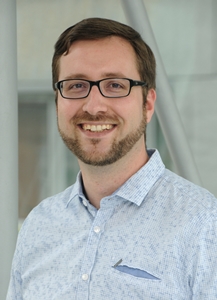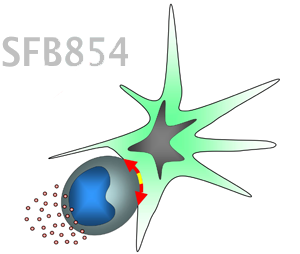About Andreas Müller
Andreas Müller, born in Switzerland in 1980, studied and received his PhD at the ETH Zürich, where he wrote his doctoral thesis on the molecular triggers for salmonella infections at the Institute of Microbiology in 2009. After that, he conducted research on the signal range of activated T cells in tissue at the Institut Pasteur in Paris and on the interaction between granulocytes in the tropical pathogen Leishmania at the University of Lausanne in Switzerland. In December 2013, Andreas Müller was appointed a W2-Professorship for "Intravital Mikroskopy of Infections and Immunity". This group works from the Institute of Molecular and Clinical Immunology at the University of Magdeburg and is cooperatively financed by HZI Braunschweig and the OvGU.
1.5 Million Euros for research on the interaction between immune cells and pathogens - ERC Grant for Prof. Andreas Müller
The European Research Council (ERC) approved an ERC Starting Grant of around 1.5 million Euros to SFB 854 member Andreas Müller, Institute of Molecular and Clinical Immunology at the Otto-von-Guericke University Magdeburg (OvGU) and member of the GC-I³. This grant shows that his research project "Dissecting the interplay between the dynamics of immune responses and pathogen proliferation in vivo“ has earned international praise. Prof. Müller has lead the group "Intravital Microscopy of Infections and Immunity", which can be found at the Univerity of Magdeburg and is funded by the Helmholz Centre for Infection Research (HZI) in Braunschweig and the OvGU, since 2013.
Prof. Müller is one of only 370 scientists from all over Europe that will receive this coveted funding this year. Only 2-3 researchers in Germany can receive an ERC Starting Grant in the category "Infection and Immune Response" per year. This funding gives Prof. Müller and his team financial freedom to dedicate their time to exciting scientific questions over the next five years.
The key aspect of the ERC-Project is the question: How do the growth of germs and the immune system affect each other? Many of these pathogens can penetrate into cells and hide from the defence mechanisms of the immune system. Some germs survive and multiply within the immune cells, whose function is to absorb them and make them harmless. How and whether these cells realize that these pathogens are multiplying inside of them is a central question of this project. Prof. Müller would also like to find out whether immune cells can figure out which germs are most dangerous and, for example, attack the pathogens that most rapidly multiply. He explained: "We must understand the relationship between the multiplication of pathogens int he body and the behavior of immune cells. Through this, we can develop new strategies to better control infections, design more effective vaccinations and further research how pathogens become resistent to antibiotic treatment during an infection." Because bacteria and parasites have developed many strategies to circumvent the immune system and medication and to multiply freely, a fundamental requirement for the development of better medications is to know exactly where and under what conditions they can spread in tissue.

In order to answer these questions, the research group of Prof. Müller developed an innovative new method to observe the microscopic growth of pathogens live in living tissue (see photo). This method fits extremely well with the research environment within the field of immunology at the Medical Faculty of the OvGU, at which expertise in new microscopy techniques has been built up over many years. In addition to intravital microscopy, with which the interaction between cells of the immune system and pathogens can be followed live, Magdeburg in particular also offers developed techniques such as Multi Epitope-Ligand Cartography (MELC), with which the position of germs can be described in minute detail. The cooperation between the institutions of the GC-I³ and with the HZI in Braunschweig are of central importance to the project. One example of a planned part of this cooperation is the sorting of immune cells, which were in contact with either quickly or slowly growing bacteria during an infection, and subsequent transcriptome analysis to see if specific signaling pathways were activated through the multiplication of pathogens.
Long term, this project should figure out how medications can intervene with the regulation of the immune system in a targeted manner. Such interventions have a wide range of applications for the treatment of many diseases, from autoimmune diseases to cancer. In order to influence the immune response at will without putting the patient at risk, a detailed understanding of the signals, with which the cells of the immune system are activated and communicate, is necessary.

ERC Starting Grants
ERC Starting Grants are a funding instrument of the European Research Council to support young scientists in the next step of their career in carrying out independent state-of-the-art research. The time between the completion of the doctorate and the application must be less than seven years, and the only decisive criterium is the scientific excellence of the researcher and the proposed project. The successful projects are funded for up to five years to a sum of up to 1.5 million Euros. More information on ERC Starting Grants can be found here.




